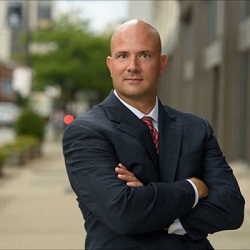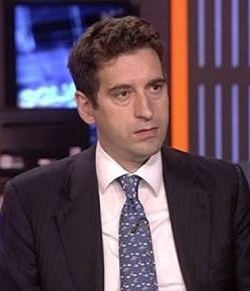Transcripts
 Erik: Returning as this week’s feature interview guest is Dr. Pippa Malmgren, one of our all-time favorite guests on this program. Pippa, thanks so much for being with us this week.
Erik: Returning as this week’s feature interview guest is Dr. Pippa Malmgren, one of our all-time favorite guests on this program. Pippa, thanks so much for being with us this week.
You know, I’ve got to ask you as a geopolitical expert, what do you think is going on at this point? And how should investors understand this whole Trump–Xi situation? Because, as I understand it, the way it comes across to me, everything was rosy until October. All fourth quarter of last year we saw 20% – more than 20% – down on the S&P, mostly driven by fear of trade war.
Now maybe we’re on the way. And we’re seeing this huge bounce and it’s all recovering. So it seems like this massive market swing has been driven largely by this. And now, I think, the message from President Trump is it’s absolutely hardline. We’re not going to negotiate. But, oh, by the way, the weather is nice at Mar-a-Lago at this time of year, so maybe we should do beers.
I’m having trouble interpreting what’s going on here. Where do you think this is headed? And what does it mean?
 Erik: Joining me next on the program is Forest for the Trees founder and Chief Investment Officer Luke Gromen.
Erik: Joining me next on the program is Forest for the Trees founder and Chief Investment Officer Luke Gromen.
Luke prepared a slide deck for today’s conversation. I strongly encourage everyone to download it. You’ll find the download link in your Research Roundup email or if you’re not yet registered just look for the red button labeled Looking for the Downloads next to Luke’s picture on our home page at macrovoices.com.
Luke, it’s been too long. Thanks for coming back on the program. You’ve had some very, very outspoken views. And when you first started writing about this stuff years ago, everybody thought you were completely crazy. Now what I’m hearing from a lot of people is maybe they think you’re early, but they don’t think you’re crazy anymore.
For people who aren’t familiar with your views, why don’t we just go ahead and dive into your slide deck? Tell us why you see the whole situation around the US dollar, US Treasury market, and so forth a little differently than the mainstream that you hear about on CNBC and Bloomberg.
 Erik: Joining me next on the program is Francesco Filia from Fasanara Capital. Francesco, thank you so much for coming back on the program. Before we get into your slide deck, which listeners can find the download link for in the Research Roundup email, or on the home page you can look next to Francesco’s picture. If you’re not yet registered, look for the button that says Looking for the Downloads.
Erik: Joining me next on the program is Francesco Filia from Fasanara Capital. Francesco, thank you so much for coming back on the program. Before we get into your slide deck, which listeners can find the download link for in the Research Roundup email, or on the home page you can look next to Francesco’s picture. If you’re not yet registered, look for the button that says Looking for the Downloads.
We do have a great slide deck coming up. But before we even get into that, I want to just remind our listeners that the first time that we interviewed Francesco on this program, his prediction was a blowup in the VIX complex. Now, we tend to give a lot of credit to Chris Cole for making that call. Really, Chris is the guy who made that call the week before it happened, on this program, and it just felt so timely.
But if you go back and listen to Francesco’s interview from several months earlier, he really predicted the same thing. So, Francesco, congratulations, you got the call right on the volatility complex blowing up as it did back in February of 2018.
Now, as I begin to look at your slide deck, as I get into Slide 3 here, you’re really looking for what sounds like not just maybe things are going to weaken, but you’re really looking for significant downside. A crash or a serious bear market.
First of all, am I correct to characterize that that is what you’re saying here? And, if so, why do you see that coming?
 Erik: Joining me next on the program is Alex Gurevich, founder and Chief Investment Officer at HonTe Investments in San Francisco.
Erik: Joining me next on the program is Alex Gurevich, founder and Chief Investment Officer at HonTe Investments in San Francisco.
I’m so excited, Alex, to have you back on the program. It has been so long. You are an interest rates guy from way back. And, boy, interest rates – Treasury yields in particular – have everybody’s head spinning.
Before we go into rates, though, why don’t we start with the bigger picture of the business cycle. Is it finally over? For so long, a lot of sceptics were saying it’s overdue for this business cycle to be ending, credit cycle to be ending. But we kept getting proven wrong, and it had a little bit more left to it.
Is it finally done?
Alex: Well, first, I’m glad to be back as well. And, second, yes, it is done. And irrevocably. I called for the end of the business cycle, actually, exactly a year ago. I pinned my tweet that we were transitioning into the late-cycle dynamics, and I feel the last 12 months were following step-by-step exactly the playbook of the ending of the last two cycles. And I think where people have disagreements and feel certain things as being the signs of economic strength, those exact things actually historically indicated the end of the cycle.
 Erik: Joining me next is Grant Williams from Real Vision Television and, of course, the “Things That Make You Go Hmmm…” newsletter.
Erik: Joining me next is Grant Williams from Real Vision Television and, of course, the “Things That Make You Go Hmmm…” newsletter.
I do want to let our listeners know that we are recording a week early in order to accommodate travel schedules, so our discussion about the markets will be about a week old. So we were not aware of anything that’s happened at the end of the last week or so.
Grant, I want to start with the big picture of markets, which doesn’t really have to be timely, which is okay.
Look, a lot of people, myself included, have said over and over again, this bull market is long in the tooth, it’s the longest one in history, it’s due to end. And we were proven wrong several times over and surprised by yet another round of all-time highs.
Have we finally gotten there? Is the top in for this cycle? Are we into at least a cyclical bear market? Or do you think maybe there’s a chance that one more time I’ll be proven wrong and we’ll be pushed to new highs?
MACRO VOICES is presented for informational and entertainment purposes only. The information presented in MACRO VOICES should NOT be construed as investment advice. Always consult a licensed investment professional before making important investment decisions. The opinions expressed on MACRO VOICES are those of the participants. MACRO VOICES, its producers, and hosts Erik Townsend and Patrick Ceresna shall NOT be liable for losses resulting from investment decisions based on information or viewpoints presented on MACRO VOICES.
